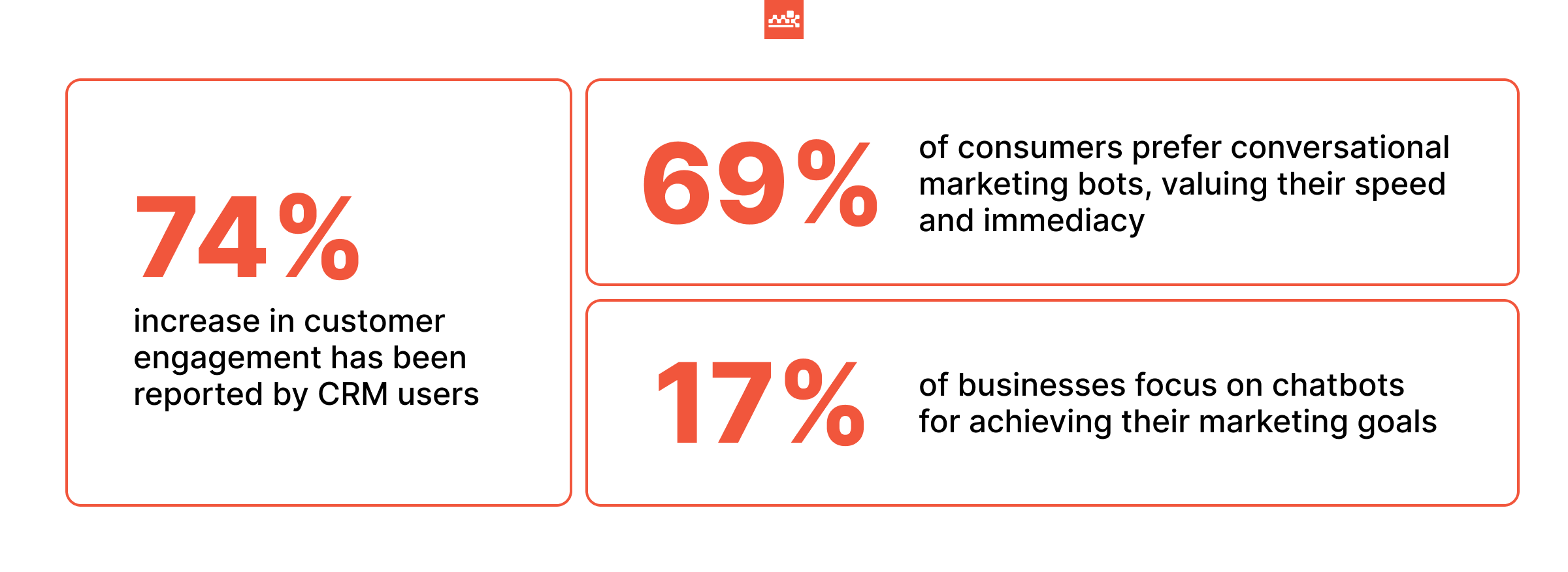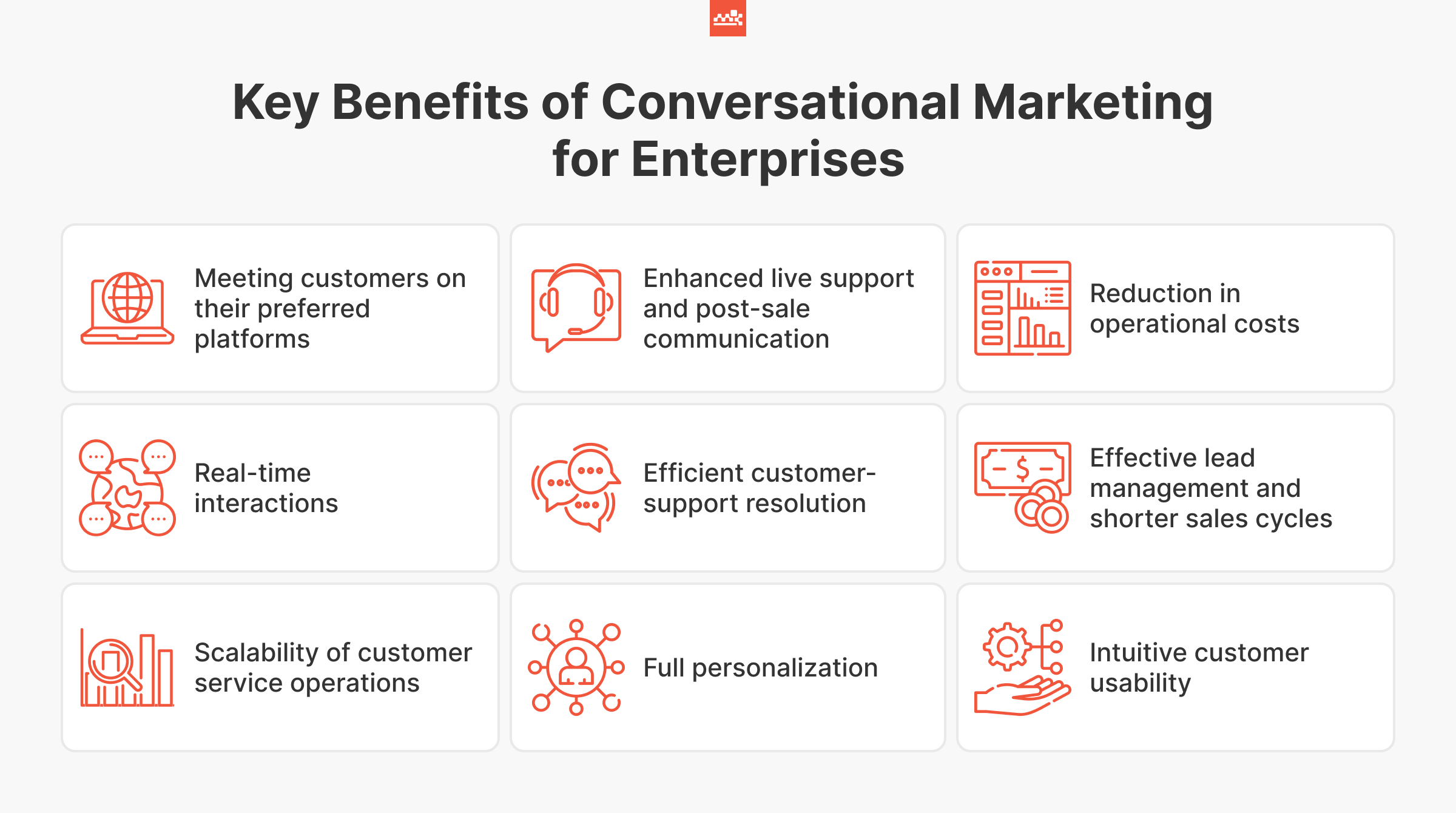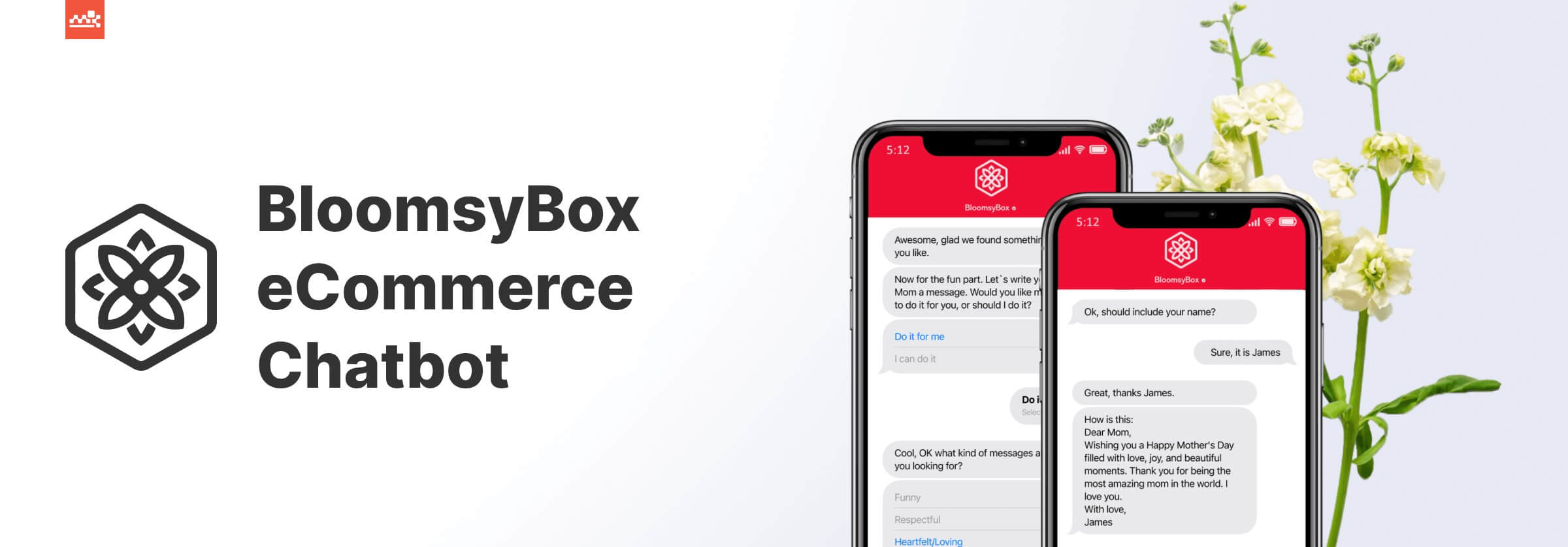Imagine, 80% of companies are now harnessing the power of conversational tools like chatbots to engage with their current clients and prospects. It’s clear this isn’t just a fleeting trend – it’s a fundamental shift in how businesses connect with their audience.
As a part of this rapidly evolving digital era, understanding and utilizing conversational marketing can be the game changer for your business needs. Consider this: approximately 79% of companies report favorable outcomes in customer loyalty, sales, and revenue after implementing a chatbot on their website. This statistic is a testament to the tangible benefits and competitive edge that this approach can bring to your enterprise. Especially, with AI integration in place.

As the Head of Digital Marketing at Master of Code Global, I’ve seen firsthand the transformative power of conversational marketing strategy for diverse industries. In this article, I’m going to dive deep into this topic, drawing from my personal experience and niche insights.
From exploring innovative tactics to sharing useful tips that have helped our clients and global leaders thrive, this piece is crafted to provide you with actionable insights and an in-depth understanding of how businesses can revolutionize their approach to customer engagement and beyond.
Table of Contents
What Is Conversational Marketing in a Nutshell?
At the heart of modern client interaction lies a dynamic and user-friendly approach that is reshaping how businesses connect with their audience. Imagine a blend of real-time messaging, personalized chatbots, and AI, all working in unison to create a more human, responsive, and engaging customer experience. This is conversational marketing, where every interaction is not just a transaction, but a meaningful dialog.
Since the dawn of the digital age, it has evolved from mere consumer care chats into a sophisticated, data-driven strategy. Now, it’s a world where AI and machine learning are not just buzzwords but tools that power real-time, personalized interactions at scale.
This evolution reflects a broader shift in consumer behavior: the desire for immediacy, relevance, and convenience in every digital dialogue. The majority of successful conversational marketing examples include but are not limited to the following key indicators:
- Real-time interaction,
- Personalization,
- Scalability through AI and chatbots,
- Seamless customer journey integration,
- Data-driven insights.
Conversational Marketing Statistics and Trends
The statistics are compelling and paint a clear picture of why businesses are rapidly adopting this approach. Let’s witness the power of conversational marketing strategy in numbers.

- Preference for Messaging Interactions: A notable 55% segment of consumers favors engaging with enterprises through messaging platforms to resolve issues, indicating a shift towards more immediate, chat-based solutions.
- Chatbot Experience Driving Interaction Rates: Data indicates that businesses providing enriching and interactive chatbot experiences have observed a substantial 70% increase in customer interactions.
- Significant Uplift in Engagement Post-Adoption: According to research by ZipDo, companies using conversational marketing chatbots have reported a remarkable 74% boost in client engagement.
- Self-Service Options Gaining Ground: HubSpot’s findings reveal that 81% of users lean towards self-service options before seeking direct help from customer service, highlighting an increasing preference for autonomous problem-solving methods.
- Chatbots in Marketing and Lead Generation: Tidio’s insights reveal that 17% of companies are now focusing on leveraging bots for achieving their marketing and qualified leads generation objectives.
- Consumer Preference for Rapid Chatbot Responses: About 69% of consumers favor using chatbots for their ability to quickly initiate contact with companies.
Looking forward, the trajectory of conversational intelligence and marketing is one of scaling and sophistication. The next 1-3 years will be crucial: if businesses don’t leverage AI in their strategies, they risk becoming obsolete — akin to brands that couldn’t adapt to remote operations during COVID-19.
As we move forward, the focus will increasingly be on creating more intelligent, context-aware chatbots and AI-driven communication tools that can offer personalized, seamless experiences at scale. The integration of these technologies into various aspects of marketing and customer engagement strategies will be paramount for staying competitive and relevant in the fast-paced digital economy.
Tangible Benefits of Conversational Marketing for Enterprises
Conversational marketing is revolutionizing the way enterprises interact with their audience. This strategy brings a host of advantages that are vital in today’s digital-first commercial environment.
Certainly, business owners, C-level executives, and other decision-makers are interested in ROI and profits. Thus, the first statistic I will share is that the strategic implementation of conversational bots can lead to a reduction in customer service costs by around 30%. So, after showcasing the financial efficiency of this approach, let’s proceed to discover other benefits.

Enhanced Customer Engagement and Personalized Experiences
One of the most significant benefits of conversational marketing is the ability to offer elevated engagement through customized interactions. It’s about creating a dialogue with customers that feels individualized and relevant to their needs. For instance, ThoughtSpot witnessed a remarkable increase in their sales conversations, reporting a tenfold rise. Additionally, they experienced a 70% growth in MQLs and a 64% boost in meetings booked.
Streamlining the Customer Journey from Discovery to Purchase
Conversational marketing bots play a crucial role in simplifying and enhancing the buyers’ journey. By providing immediate, relevant information and support, it helps guide prospects smoothly from the first encounter through to the point of sale. This seamless journey not only saves time but also significantly improves the customer experience.
Increased Conversion Rates and Customer Loyalty
Enterprises utilizing conversational marketing chatbots often see notable growth in consumer conversion and enhanced client loyalty. This approach not only addresses immediate user queries but also builds a foundation of trust and reliability, which are key to fostering long-term relationships.
Nevertheless, this is not the end. Conversational marketing holds hundreds of business benefits for both startups and enterprises. See the expanded list in the image below.

Conversational Marketing Examples for Diverse Use Cases
The introduction of an AI component into work today is not a matter of trend, but a matter of business and marketing survival, when there are not enough human resources and a targeted approach to cover all needs.
The integration of conversational marketing chatbots into business strategies has opened up a myriad of opportunities across various domains. Let’s explore how these innovative tools are reshaping interactions and processes in the corporate world.
Enhancing Product and Service Discovery
Chatbots have revolutionized the way customers discover products and services. Through intuitive interactions, they guide buyers, providing relevant information and suggestions based on their queries. This has made the discovery process more efficient, allowing users to easily find what they’re looking for, often leading to increased customer satisfaction and sales.
Streamlining Onboarding
The onboarding process is crucial for customer retention. Chatbots optimize this process by assisting new customers in navigating through sign-up procedures, setting up accounts, and understanding product features. This interactive assistance ensures a smooth and hassle-free onboarding experience, fostering a positive first impression of the brand.
Companies like Travelocity are utilizing chatbots on their websites for client support, notably in the travel planning sector. These bots use Quick Replies to swiftly address customer issues, thereby streamlining the onboarding process and enhancing the overall user journey.
Intelligent Cross-Selling and Upselling
Chatbots, with their underlying AI, are adept at making product recommendations based on buyer’s interactions and purchase history. This capability enables effective cross-selling and upselling, suggesting relevant additional products or upgrades to customers, which can lead to increased average order values and customer lifetime value.
Sephora’s Color Match uses augmented reality in its chatbot to help buyers select the right cosmetic items. This innovative use of conversational marketing techniques not only aids in product discovery but also enables personalized recommendations and results in additional purchases.
Multi-Departmental Implementation
The versatility of chatbots allows for their integration across various departments within an organization, including sales, customer service, and marketing. For the former, they can qualify leads and schedule appointments; for the latter, they can resolve common queries and escalate complex issues; and in marketing, they can personalize communication and drive engagement.
Advanced Use Cases
Chatbots are not limited to external customer interactions; they are also being used for internal employee assistance. They help streamline internal processes, answer queries, and even assist in complex scenarios such as IT troubleshooting and HR inquiries. Additionally, chatbots are being integrated with enterprise-level APIs to enhance their functionality and enable seamless interaction with other business systems.
For example, HealthJoy’s chatbot assists employees in managing healthcare benefits, indicating the potential for chatbots to aid in-house staff facing intricate situations like healthcare management.
Boosting Engagement and Interaction
Brands are increasingly employing chatbots as a part of their conversational marketing strategy. Bots provide fans and customers with instant updates, event information, and even personalized content, thereby creating a more engaging and interactive experience. This approach not only keeps the audience informed and entertained but also strengthens their connection with the brand.

For example, BloomsyBox, a floral subscription company, leveraged a Generative AI eCommerce chatbot developed by Master of Code Global. This bot was designed to create a unique gift-giving experience for customers, particularly for a Mother’s Day campaign. It engaged users with a quiz, offering the chance to win a free bouquet. Notably, 60% of those who interacted with the bot completed the quiz, and 28% got all answers correct, winning a bouquet. Additionally, 38% of participants chose to use the Generative AI feature to create personalized greeting cards, demonstrating the effectiveness of this innovative approach in enhancing customer interaction and personalization.
National Geographic also created a buzz with their Einstein bot on Facebook Messenger to promote their show “Genius,” offering users a chance to interact with a virtual Einstein. This innovative use of chatbots provided an engaging and educational experience for the audience.
How to Develop a Bulletproof Conversational Marketing Strategy
This step requires careful planning and alignment with your business’s overall milestones. Here’s how to create a strategy that resonates with your audience and amplifies your marketing efforts:
- Understand Your Objectives: Begin by defining clear goals. This could range from increasing sales and improving AI-driven customer service, to boosting engagement.
- Align with Business Goals: Ensure that your conversational marketing strategy complements and supports your broader objectives. It’s not just a standalone tool but an integral part of your overall marketing plan.
- Integrate into Existing Plans: This could mean adding chatbot functionality to your website, integrating AI assistants into customer service, or leveraging chatbots for social media campaigns.
- Adaptation is Key: Conversational marketing is a versatile tool that can be adapted to your specific needs, goals, and tasks, much like how scissors are tailored for different uses – kitchen, tailoring, medical, or manicure. The key is to customize it to fit your niche and understand where it will be most needed and appropriate.
- Cross-Communication and Interaction: It’s vital to maintain effective communication within the company including all its departments, not just in the context of promotion. Everyone should be on the same page, aware of the processes, goals, tasks, and statuses. Implementation of conversational marketing bots also aids in alerting and informing stakeholders about relevant information, ensuring that all parts of the business are informed and aligned.
- Measure and Analyze: Depending on the application, different metrics should be measured. For instance, for customer support in SaaS, criteria like NPS, CSAT, Retention Rate, LTV, CAC, ARPU/ARPPU are essential. In contrast, retail-oriented bots focus on e-commerce metrics like deals, cost of sales, users, Conversion Rate, CPA, and CPO. Always compare pre- and post-implementation measures to gauge the effectiveness of the technology, as it’s not always a one-size-fits-all solution.
Conclusion
Conversational marketing has undeniably reshaped the landscape of digital interaction and customer engagement. It stands as a testament to the evolution of market communication – from letters to emails and now to intelligent chatbots. This progression mirrors the growth of the industry and AI at large.
The future of such an approach is intertwined with the continuous advancement of technology. It’s poised to become even more integrated, offering more sophisticated, personalized, and seamless experiences.
The key is not to fear these changes but to embrace them, adapting trends to meet specific needs and objectives. However, it’s crucial to apply the technologies judiciously, guided by actual necessities rather than the allure of innovation for its own sake.
In embracing conversational marketing chatbots, businesses can stay ahead in the dynamic digital environment, ensuring they evolve alongside the field and technology, always meeting their customers where they are most comfortable and engaged.
To develop a strategy and implement it wisely with maximum efficiency, you may require comprehensive AI consulting services. Partnering with Master of Code Global is a proven resolution of such issues. Contact us to leverage the power of artificial intelligence and conversational bots for your enterprise.
Ready to build your own Conversational AI solution? Let’s chat!






